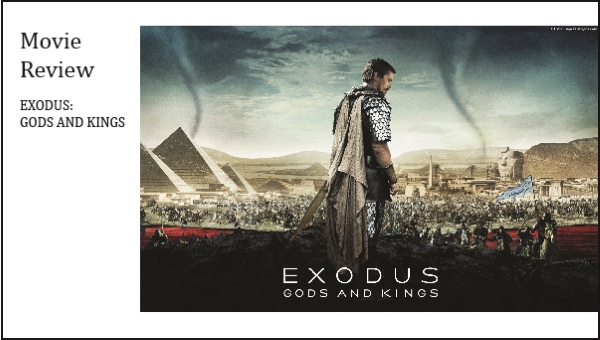By Tyson Thorne

After seeing the latest Hollywood exploit of a major Biblical story, I intended to write a review of Exodus: Gods and Kings. I considered talking about the stellar performances from the all-star cast, and the production value. All of which are exceptional. Then I thought of creating a list of all the ways the writers and directors altered the original story, which would have been remarkably long. In thinking it through I realized this isn’t the Biblical story, this is a new Moses, one where acts of nature replace acts of God, and acts of terrorism are accepted as acts of justice. A story where God is a figment of one man’s imagination after hitting his head on a rock. How can a movie be so good in so many ways and yet miss the mark so widely? Pondering this led me to a more important question, what creative liberties can one take with God’s Word?
For the past few years, Disney especially but other entertainment entities as well, have been making a lot of money through the retelling of fairytales. Movies such as Into the Woods combines characters from several different fairytales into a singular adventure, much like ABC’s Once Upon a Time has done on Network television. NBC’s Grimm puts a modern twist to the Grimm’s Fairytales creating an entire universe of new characters each week all based on those old German children’s stories. I confess I’ve watched and enjoyed many of these while fully understanding that the goal is to create something new and entertaining from something old and familiar. Why is it so different when Hollywood does the same thing with the Bible?
The solution is found in addressing the issue of creative liberty. If the goal is to use something from the Bible, including one of its characters, in a new situation in an attempt to create a new story that is intended -- and advertised -- as a work of fiction, then the story falls under creative liberty. An example would be the CW’s TV series Supernatural. The show borrows a lot from the Bible’s representation of the spiritual world and contained a story arc whereby one of the main characters took upon himself the mark of Cain (as mentioned in Genesis 3) in order to be able to wield a weapon that could destroy demons. This is an acceptable use of creative license. There is clear intention to spin something new and unique off from something mentioned but not clearly defined in the Bible, and it’s clearly a work of fiction.
A problem arises when the author of the new work either disrespects the Biblical account, forgetting that it represents real people who lived and died, and attempts to malign their character or when the author attempts to re-write a Biblical narrative (which is a historic event) and tries to present itself as better/more reliable/more accurate than the Biblical account. The movie Noah, for example, clearly drew more fairytale elements into its storyline in an attempt to punch up the adventure and give theatergoers a thrill. Does it disrespect the source material as being a real, historic event? Clearly. But the story is presented and intended to be understood as fiction. Exodus: Gods and Kings is in a different class.
Rather than adding to the adventure and the miraculous like Noah, Exodus almost removes the supernatural from the story altogether. In the historic sense, Ridley Scott did a remarkable job of accurately representing ancient Egypt. The chariots in the film are but one example. They are based on actual archaeological finds. Furthermore, the tactics the chariots employed in battle are also based on historic evidence. They represented Egypt in a way that is consistent with what modern historians would expect from the kingdom under Xerxes. The Sphinx, for example, is not completed. So it is curious why Scott chose not to extend his accuracy to the telling of the actual story. There is no back and forth between Moses and the magicians of Pharaoh’s court, matching miracle for magical in plague after plague. In fact, the miraculous nature of all but the last plague was presented as a natural event rather than supernatural. Even the parting of the Red Sea was caused by a meteor strike rather than the hand of God. These elements of the Biblical story weren’t changed for entertainment value, they were changed to persuade the audience to accept a new version of God’s story, one where God is largely irrelevant. In doing so it crosses the line from being a work of fiction taking creative liberty and becomes a thesis against faith and God’s Word.
By becoming a secular humanist representation of a Biblical account it shifts the focus from the central character of the story, God, and places it squarely on Moses and nature. By doing so it changes the entire meaning of the story from one of God’s victory over the god’s of Egypt and, therefore, goes beyond creative liberty and license.
|
|
|